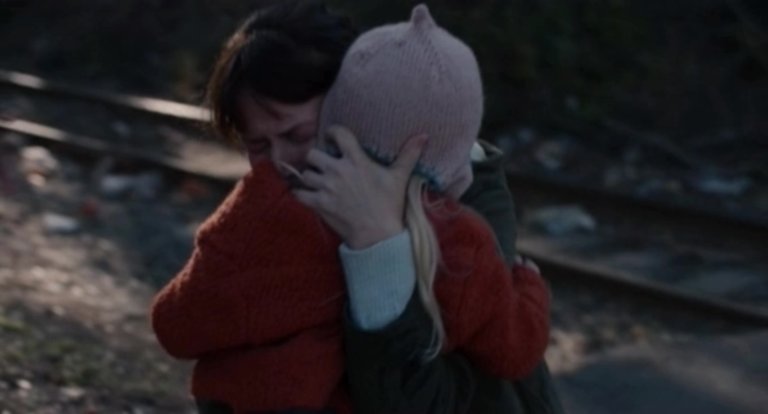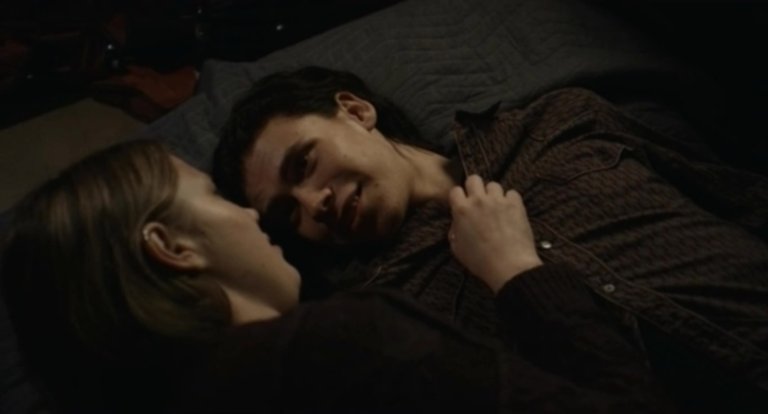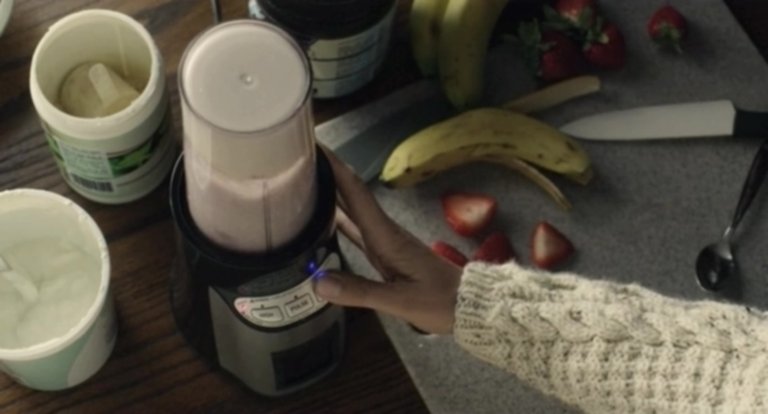Arkangel: Overprotective Mother and a Daughter Hungry for Sensation (ENG-ESP)
Hello, CineTv
A mother loses her young daughter in a playground. Terrified, she turns to the biotech company Arkangel after recovering the child, where a brain chip is implanted in the girl.

From then on, via a tablet, the mother can monitor everything her daughter sees, feels, and all her health metrics.
Thus begins Arkangel (from Black Mirror Season 4, Episode 2), directed by Jodie Foster and written by Charlie Brooker.
This unexpected control system, wielded by Marie (Rosmarie DeWitt)—a divorced mother and physiotherapist—soon becomes a second life for her, as she obsessively tracks every detail of her daughter Sara’s (Brenna Harding) experiences from childhood to adolescence. Not just tracking, but smothering.

Overprotection naturally morphs into covert control. Instead of warning Sara about potential dangers—teen pregnancy, drug use—Marie seeks revenge against Trick (Owen Teague), Sara’s boyfriend who threatens to "harm" her baby.

The episode effectively contrasts the evolution of two personalities: the overprotective mother and the repressed, rebellious daughter.
Here, a surveillance tool meant to support human relationships (ideally built on trust) is weaponized to secretly manipulate a loved one’s life—worse, to stifle free will, choice, and even the freedom to make mistakes.

Marie, haunted by her initial trauma and later by her lack of trust in Sara, conflates protection with repression. Her intentions are noble—after all, what parent doesn’t want to keep their child safe?—but her methods, rooted in secrecy and aggression, only destroy their bond.
As a viewer, I wondered: Why not have an open, honest conversation with her daughter, since she holds absolute informational power? But some people are simply wired this way—shy, conservative, yet stubborn.
In the end, people are like the weather: unlikely to change. Accept them or go mad. Anacondas will never behave like affectionate pets. They’re patient, persistent, camouflaged, opportunistic. Like Marie.
Thus, the plot’s progression feels psychologically and dramatically coherent. Of course, the climax is tragic when Sara discovers the truth—that her mother caused her pain.

Here, technology’s misuse boomerangs on the controller.
Yet the final confrontation strains believability. Would a rebellious daughter react so violently as to physically attack her mother—the woman who, despite secret control, loved her, shared childhood games, and cared for her health and emotional stability?

Years of accumulated affection wouldn’t vanish in a fit of rage. It all ends as it began: loss and estrangement.
The film left a bitter taste, highlighting how incompatible personalities poison relationships.
Though a character claims the experiment was banned in Europe and discontinued in the U.S., lingering questions remain:
- Will our children or grandchildren have brain implants?
- Could we have them unknowingly?
- What would I do with a control device like Marie’s?
- And… what would you do?
EN ESPAÑOL
Arkangel: Madre sobreprotectora e hija con hambre de sensaciones
Una madre pierde a su hija pequeña en un parque de juegos. Se asusta tanto que, después de recuperarla, decide acudir a la compañía biotecnológica Arkangel, donde implantan a la niña un chip cerebral.

En adelante, mediante un tablet, la madre podrá conocer todo cuanto ve su hija, lo que siente y todos sus indicadores de salud.
Así comienza Arkangel, (de la serie Black Mirror 04:02), episodio dirigido por Jodie Foster, con guión de Charlie Brooker.
Este inesperado sistema de control, en manos de Marie (Rosmarie Dewitt), una madre divorciada y fisioterapeuta, pronto se convierte en una segunda vida para ella, ya que se dedica a seguir al detalle las experiencias de su hija Sara (Brenna Harding), desde la infancia hasta la adolescencia. Más que seguirla, a sobreprotegerla.

De la sobreprotección pasa naturalmente al control secreto, pero en lugar de advertir y aconsejar a Sara, sobre posibles peligros —como el embarazo adolescente y el consumo de drogas—, se dedica a tomar venganza contra Trick (Owen Teague) el novio de su hija que pretende "dañar" a su bebé.

Creo que el mediometraje refleja de forma eficaz la evolución contrastiva entre las dos personalidades: la madre sobreprotectora y la hija reprimida que se rebela.
En este caso, un dispositivo de supervigilancia, en vez de ser usado como apoyo de las relaciones humanas (idealmente basadas en la confianza mutua), se utiliza para manipular de manera secreta la vida de un ser querido. Y lo peor: coartar su libre albedrío, la libertad de elección, incluso, la libertad de equivocarse.

Creo que debido a su trauma primero, y luego a la falta de confianza e intimidad de Marie hacia su hija, esta madre llega a confundir protección con represión. Sus intenciones son siempre nobles pues, ¿qué padre no desea mantener a salvo a sus hijos?, pero su método, basado en el secretismo sostenido y la agresión a terceros, solo conduce a la (auto) destrucción de la relación filial.
Como espectador me pregunté ¿Por qué no tiene una conversación sana y transparente con su hija, si en última instancia, ella tiene el poder de la información absoluta? Pues bien, creo que hay personas que son así. Es su estilo. Un estilo tímido y conservador, pero estilo al fin.
En definitiva, la gente es como el clima, es difícil que cambien solo porque uno lo desee; por lo que hay que aceptarlas como son o te vuelves loco. Las anacondas nunca se comportarán como un cariñoso animal doméstico. Son pacientes, perseverantes, adictas al camuflaje y oportunistas. Como Marie.
Por eso creo que desde el punto de vista psicológico y dramatúrgico es coherente la evolución de la trama. Obvio, el desenlace es trágico cuando Sara lo descubre todo, cuando comprende que su madre fue la causa de su dolor.

Aquí el mal uso de la tecnología se vuelve como un boomerang contra la controladora.
Pero lo que sí me parece un fallo del guión es la escena clímax. ¿Podría una hija rebelde tener una sobrerreacción tan violenta como para atacar físicamente a su madre; la persona que, aunque la controlaba en secreto, siempre la amó, compartió juegos de infancia, se preocupó por su salud y su estabilidad emocional?

Esos estratos afectivos, acumulados durante años, no creo verosímil que desaparezcan por un arrebato de ira.
Todo termina como empezó: Pérdida y alejamiento de un ser querido.
El filme me dejó un regusto amargo por lo difícil que resultan las relaciones cuando existe incompatibilidad de caracteres.
Aunque un personaje afirma que el experimento fue prohibido en Europa y será descontinuado en los Estados Unidos, me quedaron ciertas preguntas para reflexionar:
- ¿Tendrán nuestros hijos y nietos un implante en el cerebro?
- ¿Lo tendremos nosotros sin saberlo?
- ¿Qué haría yo si dispusiera de un artefacto de control como el usado por Marie para vigilar a su hija?
- Y... ¿qué harías tú?
Uf... ¡Tengo que buscar esta serie para verla luego de este magnífico reporte que nos has hecho!
Sí, amigo. Impresionantes todos los capítulos. La recomiendo.
¿La tienes en casa como para que me la dejes copiada en casa de @lizandra?
Interesante, luego de la protección viene la curiosidad y esa es la tentación. Excelente tu post.
Tienes razón, a veces es una cadena. Hay que tener el tino de conocer dónde detenerse. Gracias por leer
You received an upvote ecency
I don't think anyone should have that much access and surveillance over another, it's bound to be abused irrespective of how they may love the person.
I don’t believe living as in the novel 1984 is right, but neither is the unchecked chaos that led to the World Wars beneficial. Perhaps we’re advancing toward a much-needed equilibrium. I place my faith in transhumanism. Thank you for reading and sharing your thoughts, friend.